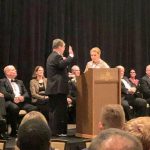Medical Society’s New President Preps for Assembly Session
via Virginia Lawyer’s Weekly
By Maura Mazurowski
The Medical Society of Virginia will focus on Medicaid expansion and the elimination of “surprise billing” during the 2020 General Assembly session, according to the group’s new president.
Clifford L. Deal III, chief of surgery at Henrico Doctors’ Hospital, was installed as the 199th president of the physician advocacy group last month.
“Physicians must be involved in the overall execution of the healthcare plan, not just care at the bedside,” Deal said in his inaugural speech. “There has never been a more important time to be involved in organized medicine.”
In an interview with Virginia Lawyers Weekly, Deal shared his priorities for the 2020 legislative session, the group’s role in state politics and the responsibility of medical professionals to fight for health care that upholds physician values. He said that in recent years, Medicaid has gotten by on paying “unreasonable rates” that have not kept up with inflation. As a result, groups of physicians are becoming so economically challenged that they are unable to provide patient care.
“Ask somebody on Medicaid how hard it is to find a pediatrician in Richmond,” Deal said. “The options are limited…[Pediatricians] cannot spend the time they need for a sick child.”
Richmond lawyer and lobbyist Scott Johnson, who has been the MSV’s general counsel since 2002, also emphasized the importance of increased reimbursement rates for Medicaid providers.
“Hospitals two years ago got a bump up in their reimbursement, and certainly physicians would like to see equal treatment,” Johnson said. “Just making a penny or two increase isn’t going to do it; it needs to be an epic change and a meaningful increase.”
Another continuing issue from last year’s session is balance billing, or “surprise” billing, in which an out-of-network medical provider bills a patient for costs that are not paid by their insurance company. In 2019, Sen. Glen Sturtevant, R-Midlothian, introduced Senate Bill 1763 that would have prohibited balance billing for emergency care and required physicians be paid the regional commercial average directly.
The bill was killed. However, Deal anticipates it will be another topic of discussion at next year’s session.
“The society, the hospitals and the patients were united on one side of the legislation… insurance companies were on the other,” Johnson said. “That spectrum, if you will, was very telling to a lot of the legislators.”
Johnson said that in an ideal world, Congress would pass a bill that would “take patients out of the middle” and allow out of network providers and insurance companies to voluntarily negotiate a fair payment amount.
“The second thing is, if you don’t work it out voluntarily, you’ve got to look to some independent decision maker to help say what should be a fair payment,” Johnson said.
Virginia Democrats won majorities in both the House of Delegates and the Senate last week, giving Democrats full control of state government for the first time since 1994. However, Johnson said the election results are unlikely to impact the medical society’s goals for the upcoming Assembly session one way or the other.
“We’ve got a very strong relationship with both sides of the aisle,” Johnson said. “The white coat that physicians wear has a commonality that brings [legislators] together to do what’s best for the patient, and we’re going to work with whoever is in control at the time to do that.”
Johnson added that MSV and the Virginia Trial Lawyers Association are adamant about working together to see legislation passed.
“Years ago, the General Assembly basically said that if doctors and trial lawyers cannot be in agreement on something, they’re not going to pass any bills or take action,” Johnson said. “We try to make sure that neither association has something unless there’s adequate support regardless of political control.”
Deal, a practicing surgeon with more than 15 years of experience, took office at the annual MSV meeting at The Homestead in late October. According to Deal, his path to medicine was “a little nontraditional.” After graduating from the first coed class of Washington & Lee University, Deal spent four years commissioned in the Army. He started medical school at Virginia Commonwealth University Medical College of Virginia when he was 29 years old.
“I wanted to serve first. Then I got out and went to medical school, and that took me in this direction,” Deal said. “It’s a dream come true. Really.”
Founded in 1820, the MSV celebrates its 200th anniversary next year. In honor of the organization’s history, the MSV foundation will take a traveling exhibit throughout the state that will feature photos and facts of the group’s history and medical history in Virginia.
“We’re looking at what type of organization we want to be for the next 200 years,” said Jenny Young, director of membership at MSV. “You think about the physicians that started this 200 years ago, that had this dream and vision, and how we can continue that.”
Deal said that his favorite part about being a surgeon is the unique opportunity to participate in his patients’ lives.
“You’re helping to make a difference in an individual person’s life,” Deal said. “And that is a gift to feel like you do that every day.”
MSV is the voice for more than 30,000 medical professionals and students across the commonwealth since 1820. Headquartered in Richmond, the organization falls at the intersection of medicine and law, working to represent the interests of more than 30,000 medical professionals and students throughout the state to ensure that their needs – and the needs of their patients – are properly considered when legislators make the rules.
Deal’s presidency will continue until the MSV meeting in October 2020, where the group will have a formal 200th anniversary celebration.”



